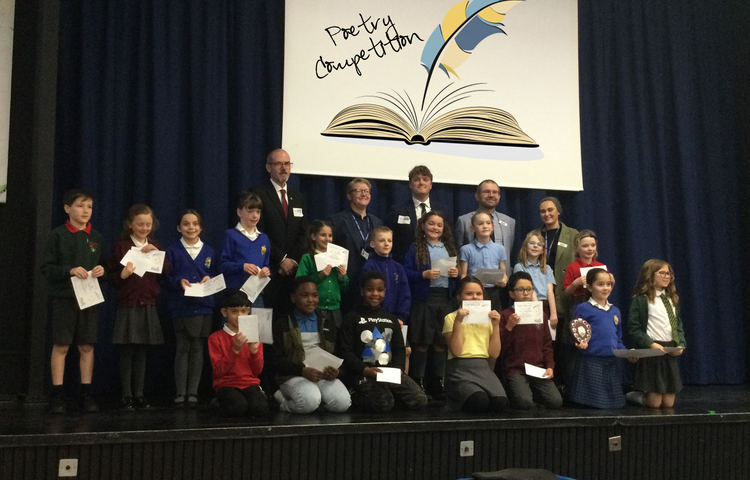English
Our Philosophy
“There is no use trying," said Alice; "one can't believe impossible things."
"I dare say you haven't had much practice," said the Queen. "When I was your age, I always did it for half an hour a day. Why, sometimes I've believed as many as six impossible things before breakfast."
It is more important than ever that we recognise the importance of English as a means of developing a child and the person they will become as they grow up. Therefore, at the end of this part of their academic career, pupils will leave Penwortham Priory Academy enriched, inspired and with the belief that anything is possible for them to achieve. Thus, the educational aims for the English curriculum are to provide pupils with a curriculum that is engaging, inspiring and challenging for all, regardless of their ability. English is fundamental to education and society, meaning it is the responsibility and priority of all English teachers to ensure pupils are well equipped to meet the demands of adulthood and the world outside of education. Our philosophy is for pupils to be able to successfully communicate their ideas and emotions in a clear and effective manner. We want to foster a love and interest for reading, creativity and critical thinking, showing pupils how they can embed the knowledge from the English curriculum into their life and personal experiences.
We have endeavoured to produce a curriculum where a range of texts are used to create mirrors for our students to reflect upon their own experiences and identity, as well as offering them windows into other worlds (be that past or present). With our range of text choices, pupils can reflect upon experiences beyond their immediate sphere, giving them a better understanding of the wider world. Whilst, we consistently encourage pupils to strive for academic success, we passionately believe in delivering a uniquely Key Stage 3 experience for our students, where we seek to enthuse them about our subject and develop knowledge and understanding which we know will not be explicitly examined.
Intent
The Penwortham Priory Academy English Curriculum will enable pupils to:
- Become immersed in other places and cultures.
- Appreciate their literary heritage.
- Develop a strong moral compass, empathy and a clear idea of self.
- Develop confidence in using their voice to express themselves orally and in written communication.
- Engage in structured discussion so that they are able to actively consider viewpoints and experiences that differ to their own.
- Develop oracy skills to a high level, encouraging them to verbally express themselves clearly, coherently and in a manner appropriate to the context.
- Develop active listening skills so that they are able to respond to others in a courteous, respectful and purposeful manner.
- Take part in formal debates so that they can present their own viewpoints thoroughly.
- Develop inference and critical analysis skills, whilst also fostering a love of reading.
- Develop confidence in their abilities to use taught strategies to explore texts of high challenge.
- Write accurately and imaginatively for a range of purposes and audiences, using the highest quality language and structural devices.
- Appreciate the notion that a text is the product of a specific context and authorial intent.
- Develop a repertoire of ambitious vocabulary so that pupils are equipped with the language required to express themselves effectively, expressively, and accurately.
- Reflect upon their own social and moral viewpoints and change or alter them accordingly.
- Be passionate about the works of others as well as their own literary works.
- Make good progress regardless of starting point or social background.
For more information on our Curriculum Intent, please view our 'Curriculum Statement 2024-2025' document.
English Department Staff
Miss Beswick - Head of English
Mrs Brindle - English Teacher
Mrs Elliott - English Teacher
Mr Owen - English Teacher
Mrs Robinson-Ali - English Teacher
Miss Thornton - English Teacher and Research, CPD and Teacher Development Lead
Mrs Webster - English Teacher
Lessons
Year 7 - 4 Hours Per Week + 1 Hour Reading Plus
Year 8 - 4 Hours Per Week + 1 Hour Reading Plus
Year 9 - 4 Hours Per Week + 1 Hour Reading Plus
Year 10 - 5 Hours Per Week
Year 11 - 5 Hours Per Week
Curriculum Statement - English 2024/2025
Curriculum Implementation
At the start of the 2023/24 academic year the department gained new leadership and the curriculum was overhauled. While we were able to begin this process, it was not viable to implement our full curriculum during this transition period. Instead, we sought to implement key changes to how we approach teaching and learning within the department, ensuring those elements of the new curriculum that we have introduced close any gaps in prior learning and adequately equip students with the key skills needed to succeed in our subject, giving appropriate time to practice these and therefore providing a high level of challenge to all pupils. At Key Stage 4, we have added master classes, whole year revision sessions and walking, talking mock sessions to ensure the best possible outcomes for our pupils ensuring they have a curriculum which is not only challenging but builds their confidence in approaching GCSE. Please view our 'Curriculum Statement 2024-2025' document to see how we will develop English provision at Penwortham Priory in the coming months and years.
Approaches to Teaching and Learning in English
In English lessons, pupils are taught to master the English language and to appreciate literature. All pupils study the subject throughout Years 7, 8 and 9 and at GCSE we enter every child for both English Language and English Literature (Eduqas syllabus). Our lessons are focused primarily on considering ‘Big Questions’ and exploring ‘Big Ideas’ through which we encourage pupils to think analytically, critically and creatively. This allows them to opportunity to actively engage with the viewpoints of others. Structured academic discussion and debate in which pupils are challenged to express their viewpoints, consider others and respond to them either through building on what has been said or challenging them in an informed manner is a core element to the delivery of English at Penwortham Priory. Furthermore, our expectations of our pupils are extremely high. Pupils are constantly encouraged to reflect upon their own work and to always seek to improve once given feedback. Modelling, quality teacher explanation and questioning, proofreading and editing are fundamental components of our curriculum as they ensure that pupils continue to make progress across all years.
Across both key stages, pupils are exposed to an array of fiction texts (including the use of ‘umbrella texts’), non-fiction texts and poetry from different cultures. Writing for specific audiences and purposes also accounts for a significant portion of our curriculum time.
The essential ingredients of English lessons at Penwortham Priory might include:
- Structured in-depth and mature discussion and formal debate.
- Use of whiteboards to encourage participation and address misconceptions.
- The use of hinge questions to assess that all learners have mastered key points of learning before moving on and, subsequently, providing the opportunity to revisit these if required.
- The use of ‘think, pair, share’ to allow pupils to rehearse and share ideas (and develop confidence) before sharing them in a whole class context.
- Quality modelling and co-writing class responses (through ‘I Do, We Do, You Do’).
- The use of active reading and ARC to support pupils to explore challenging texts.
- Low stakes testing and interleaving and retrieval of prior knowledge.
- The use of ‘ABC Oracy’, where pupils have structured discussion, encouraging them to ‘Answer’ questions, ‘Build’ on each other’s views and ‘Challenge’ different perspectives.
- Quality questioning and explanation of challenging concepts which seek to explore pupils’ way of thinking as well as extending their thinking.
- Teaching that responds to the need of all pupils.
For more information on our Curriculum Implementation, please view our 'Curriculum Statement 2024-2025' document.
English Curriculum
Impact
At the start of the 2023/24 academic year the department gained new leadership and the curriculum was overhauled. Our 2024 GCSE results therefore reflect, in the main, the previous curriculum approach and do not fully demonstrate the impact of our new curriculum and schemes of learning that are now in place. However, GCSE results of the 2025 cohort will provide a more accurate indication of the success of our curriculum changes and their implementation.
2024 GCSE English Outcomes
|
Subject |
9 - 7 % |
9 - 5 % |
9 - 4 % |
|
English Language |
11 |
41 | 62 |
| English Literature | 10 | 36 | 55 |
Enrichment, Personal Development and Careers
We recognise that as a subject, English is uniquely placed to help develop pupils’ cultural capital and develop their skills beyond a classroom.
Our enrichment programme is still under development for the 2024/25 academic year but will likely include author visits, theatre visits, engagement with local colleges and year group competitions.
We recognise that English sits at the heart of most personal development and careers opportunities as communication skills are a vital part of everyday life. Again, we are planning on engaging with local colleges and members of different professions to allow our pupils to see where English can take you in 2024/25.
While we continue to plan these opportunities going forward, below you will find some ideas about where English can take you after school.
Extra Curricular Clubs
-
Our extra-curricular clubs are currently under development for 2024/2025. However, our library is open every lunch time and break time for pupils to make the most of. Pupils can read, browse books, play chess or any of the other board games we have available.
House Competitions
-
Annual 'Priory Bookmark' Competition. We ask KS3 pupils to participate in designing our annual bookmark. This is a way for pupils to be creative and design something that will inspire people to read.
-
A range of World Book Day competitions including: 'Guess the Bookshelf', 'Name the Author' and much more!
-
Create a Christmas Myth - Year 7
Trips and visits
-
We are planning a theatre visit to the Palace Theatre in July 2024 to see Aladdin. Pupils from across all year groups will be attending.
-
We are also taking our KS4 pupils to watch a theatre performance of 'An Inspector Calls' in January 2025.
-
As a department, we are always looking for theatre performances to attend, both to help with pupils' studies, but also to promote a love and enjoyment of theatre.
-
Earlier this year, we were lucky enough to have a visit from author Ruth Eastham, who delivered an inspiring talk to our Year 7 pupils. Author visits and talks are something that carry a lot of value in inspiring and encouraging pupils to have a passion for writing, therefore, we aim to hold at least one author visit annually.
-
As we look to grow our trip and visit opportunities, we are hoping to plan a range of trips and visits that link closely to our curriculum topics, to enrich pupils' experiences.
Cultural Experiences
-
World Book Day, theatre visits and trips to attractions, libraries and museums all help us to offer pupils cultural opportunities and experiences, enriching their experience of English but also offering them an insight into their own literary heritage.
Where can studying English take you?
Revision Techniques Videos
Revision Support Documents
Related News
Year 10 Pupils Train as Reading Mentors to Support Younger Readers
A group of Year 10s have received professional online training to become Reading Mentors.
From Primary To Priory: A Day to Rhyme-mber
Primary pupils visited Priory for a lively and inspiring poetry competition.


